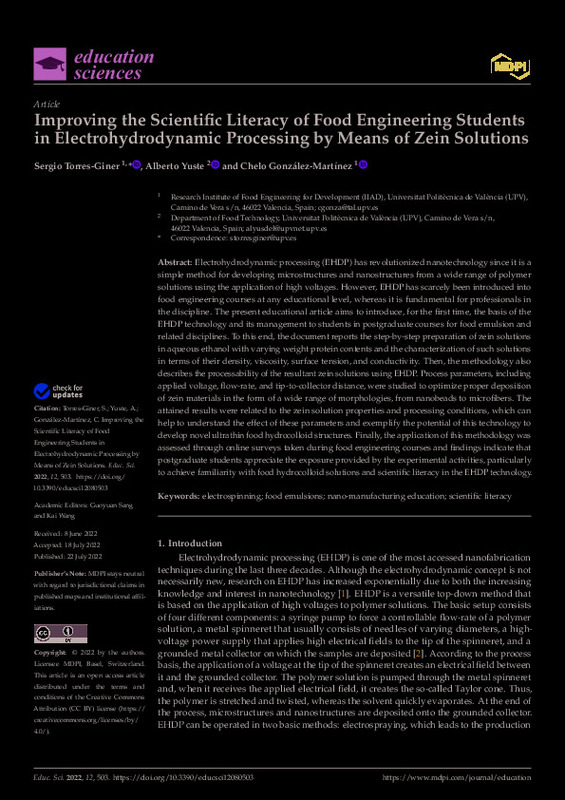JavaScript is disabled for your browser. Some features of this site may not work without it.
Buscar en RiuNet
Listar
Mi cuenta
Estadísticas
Ayuda RiuNet
Admin. UPV
Improving the Scientific Literacy of Food Engineering Students in Electrohydrodynamic Processing by Means of Zein Solutions
Mostrar el registro sencillo del ítem
Ficheros en el ítem
| dc.contributor.author | Torres-Giner, Sergio
|
es_ES |
| dc.contributor.author | Yuste Del Carmen, Alberto
|
es_ES |
| dc.contributor.author | González Martínez, María Consuelo
|
es_ES |
| dc.date.accessioned | 2023-10-26T18:02:02Z | |
| dc.date.available | 2023-10-26T18:02:02Z | |
| dc.date.issued | 2022-08 | es_ES |
| dc.identifier.uri | http://hdl.handle.net/10251/198872 | |
| dc.description.abstract | [EN] Electrohydrodynamic processing (EHDP) has revolutionized nanotechnology since it is a simple method for developing microstructures and nanostructures from a wide range of polymer solutions using the application of high voltages. However, EHDP has scarcely been introduced into food engineering courses at any educational level, whereas it is fundamental for professionals in the discipline. The present educational article aims to introduce, for the first time, the basis of the EHDP technology and its management to students in postgraduate courses for food emulsion and related disciplines. To this end, the document reports the step-by-step preparation of zein solutions in aqueous ethanol with varying weight protein contents and the characterization of such solutions in terms of their density, viscosity, surface tension, and conductivity. Then, the methodology also describes the processability of the resultant zein solutions using EHDP. Process parameters, including applied voltage, flow-rate, and tip-to-collector distance, were studied to optimize proper deposition of zein materials in the form of a wide range of morphologies, from nanobeads to microfibers. The attained results were related to the zein solution properties and processing conditions, which can help to understand the effect of these parameters and exemplify the potential of this technology to develop novel ultrathin food hydrocolloid structures. Finally, the application of this methodology was assessed through online surveys taken during food engineering courses and findings indicate that postgraduate students appreciate the exposure provided by the experimental activities, particularly to achieve familiarity with food hydrocolloid solutions and scientific literacy in the EHDP technology. | es_ES |
| dc.description.sponsorship | S.T.-G. acknowledges the Spanish Ministry of Science and Innovation (MICI) for the funding received during his Ramon y Cajal contract (RYC2019-027784-I). | es_ES |
| dc.language | Inglés | es_ES |
| dc.publisher | MDPI AG | es_ES |
| dc.relation.ispartof | Education Sciences | es_ES |
| dc.rights | Reconocimiento (by) | es_ES |
| dc.subject | Electrospinning | es_ES |
| dc.subject | Food emulsions | es_ES |
| dc.subject | Nano-manufacturing education | es_ES |
| dc.subject | Scientific literacy | es_ES |
| dc.subject.classification | TECNOLOGIA DE ALIMENTOS | es_ES |
| dc.title | Improving the Scientific Literacy of Food Engineering Students in Electrohydrodynamic Processing by Means of Zein Solutions | es_ES |
| dc.type | Artículo | es_ES |
| dc.identifier.doi | 10.3390/educsci12080503 | es_ES |
| dc.relation.projectID | info:eu-repo/grantAgreement/AGENCIA ESTATAL DE INVESTIGACION//RYC2019-027784-I//AYUDA ADICIONAL RAMON Y CAJAL/ | es_ES |
| dc.rights.accessRights | Abierto | es_ES |
| dc.contributor.affiliation | Universitat Politècnica de València. Departamento de Tecnología de Alimentos - Departament de Tecnologia d'Aliments | es_ES |
| dc.contributor.affiliation | Universitat Politècnica de València. Escuela Técnica Superior de Ingeniería Agronómica y del Medio Natural - Escola Tècnica Superior d'Enginyeria Agronòmica i del Medi Natural | es_ES |
| dc.contributor.affiliation | Universitat Politècnica de València. Instituto Universitario de Ingeniería de Alimentos para el Desarrollo - Institut Universitari d'Enginyeria d'Aliments per al Desenvolupament | es_ES |
| dc.description.bibliographicCitation | Torres-Giner, S.; Yuste Del Carmen, A.; González Martínez, MC. (2022). Improving the Scientific Literacy of Food Engineering Students in Electrohydrodynamic Processing by Means of Zein Solutions. Education Sciences. 12(8):1-17. https://doi.org/10.3390/educsci12080503 | es_ES |
| dc.description.accrualMethod | S | es_ES |
| dc.relation.publisherversion | https://doi.org/10.3390/educsci12080503 | es_ES |
| dc.description.upvformatpinicio | 1 | es_ES |
| dc.description.upvformatpfin | 17 | es_ES |
| dc.type.version | info:eu-repo/semantics/publishedVersion | es_ES |
| dc.description.volume | 12 | es_ES |
| dc.description.issue | 8 | es_ES |
| dc.identifier.eissn | 2227-7102 | es_ES |
| dc.relation.pasarela | S\470728 | es_ES |
| dc.contributor.funder | AGENCIA ESTATAL DE INVESTIGACION | es_ES |
| dc.subject.ods | 04.- Garantizar una educación de calidad inclusiva y equitativa, y promover las oportunidades de aprendizaje permanente para todos | es_ES |








